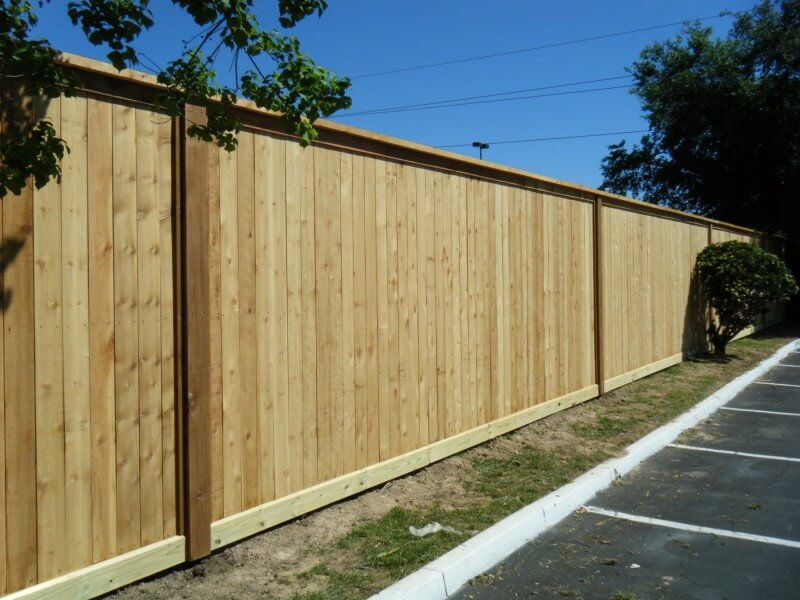Commercial Wood Fences: Best Installation, Contractors, and Durability
Commercial Wood Fences
When it comes to aesthetically pleasing, long-lasting, and cost-effective solutions to secure your commercial properties, nothing beats the blend of functionality and charm offered by commercial wood fences. Imagine combining high-impact protection with a rustic appeal that effortlessly enhances your property’s visual sophistication. Stay with us as we unlock the full potential of commercial wood fences – because every respectable business deserves a sturdy yet elegant barrier.

Types of Commercial Wood Fences
Wood fences have long been a popular choice for commercial properties due to their timeless appeal and natural beauty. They offer privacy, security, and aesthetic enhancement to various types of businesses.
Vertical Board Fence: Classic and Versatile
The vertical board fence is a classic option that blends well with both traditional and contemporary commercial settings. It consists of vertically placed boards attached to sturdy horizontal rails. This type of fence offers excellent privacy and security while adding a touch of elegance to the property. The spacing between the boards can be adjusted according to the level of privacy desired.
Stockade Fence: Maximum Privacy and Security
If privacy and security are paramount for your business, a stockade fence might be the ideal choice. This fence style features tightly spaced vertical boards that overlap each other, creating a solid wall-like barrier. The lack of gaps in the design ensures maximum privacy while also preventing potential intruders from easily accessing your property. Stockade fences can help create a secure environment for commercial establishments such as manufacturing facilities, warehouses, or storage yards.
Board-on-Board Fence: Enhanced Aesthetics with Privacy
For businesses seeking attractive commercial wood fences that combines aesthetics with privacy, a board-on-board fence is an excellent option. This style features vertical boards attached alternately on either side of horizontal rails, overlapping each other slightly. This construction creates an appealing visual effect where no gaps are visible between the boards. Board-on-board fences offer good levels of privacy while also providing an appealing backdrop that complements the overall design of the property.
Each type of commercial wood fence offers its own set of advantages and can be customized to suit specific business needs. By understanding the different options available, businesses can make an informed decision based on their requirements for privacy, security, and visual appeal.
Picket Fence: A Simple yet Effective Option
When it comes to commercial properties seeking a charming and approachable appearance combined with the functional benefits of a wood fence, a picket fence is often an ideal choice.
Picket fences are characterized by evenly-spaced vertical boards (pickets) attached to horizontal rails. This classic design creates an open and welcoming feel while still providing a clear border for the property. These fences are commonly found surrounding small businesses, restaurants, cafes, or boutique shops where adding a touch of charm and curb appeal is essential.
The visual appeal of picket fences goes beyond their simplicity. They have a timeless quality that complements various architectural styles, making them suitable for both traditional and modern commercial buildings. Their low profile allows for unobstructed visibility into the property while still acting as an effective deterrent to potential trespassers.
Picture a quaint local cafe with outdoor seating, enhanced by a white picket fence that adds character and defines the boundary without isolating customers from the passersby or neighborhood’s charm.
Maintenance for picket fences is relatively straightforward compared to other types of wood fences. Regular inspections for damage or decayed boards and occasional repainting or staining can keep a picket fence looking fresh and vibrant year after year.
Just like how a picket fence creates a welcoming ambiance for a commercial property, it can be likened to a friendly smile that invites people in while maintaining a sense of security.
Implementing Privacy Fences
Privacy is a crucial aspect for many commercial properties, whether it’s to shield outdoor areas from prying eyes, create serene spaces for employees, or enhance the security of valuable assets. This is where privacy fences come into play as an essential feature for various commercial spaces. These fences are designed with features that prevent outsiders from easily seeing inside the property while providing a sense of seclusion and tranquility within.
One common application for privacy fences in the commercial sector is around businesses such as spas, resorts, and hotels. By implementing privacy fences, these establishments can create intimate spaces for their patrons to relax without worrying about unwanted interruptions or prying eyes. For example, imagine a stunning luxury hotel with an outdoor pool area bordered by tall and visually impenetrable wooden privacy fences. The guests can experience true serenity and enjoy their time in a private oasis away from public view.
Another common use-case for privacy fences in the commercial realm is securing industrial complexes, warehouses, or storage yards. These types of establishments often have valuable inventory or equipment that needs protection from theft or trespassing. By installing sturdy and tall privacy fences made from durable wood, businesses can deter potential intruders and make it challenging for unauthorized individuals to gain access to the property. This not only enhances security but also provides peace of mind for business owners who can focus on operations without constantly worrying about external threats.
Decorative Fencing: Blending Utility with Aesthetics
When it comes to enhancing the appearance and overall appeal of commercial spaces, decorative fencing serves as an excellent option. These fences go beyond mere functionality by incorporating intricate designs and architectural elements that can transform any ordinary property into a visually pleasing and inviting space. Decorative fencing strikes the perfect balance between practicality and aesthetics, making it an ideal choice for various commercial applications.
For instance, imagine a quaint café situated within a bustling urban area. To create an inviting and charming outdoor dining experience, the café owner might opt for decorative wooden fencing adorned with artistic patterns or ornamental details. This type of fence not only acts as a boundary but also adds character to the establishment, catching the attention of passersby and enticing them to step inside.
Decorative wooden fences can also be used in retail spaces such as boutique stores or outdoor shopping centers. These fences can incorporate unique designs, intricate lattice work, or even custom branding elements that align with the brand’s image and create visual interest. By seamlessly blending utility with aesthetics, decorative fencing becomes a marketing tool for businesses, effectively capturing the attention of potential customers and setting their establishments apart from competitors.
In addition to their visual appeal, decorative wood fences can also serve practical purposes. For example, they can be designed with arched tops or scalloped edges to deter climbing or discourage unauthorized access while maintaining an elegant appearance.
Think of decorative fencing as the final touch on a beautifully decorated cake – it adds that extra layer of appeal and makes it stand out from the crowd.
So far, we have discussed the implementation of privacy fences to provide seclusion and security in commercial spaces along with the blend of utility and aesthetics offered by decorative fencing.
Benefits of Commercial Wood Fences
Wood fencing has been a popular choice for fence installation in the commercial space for several reasons. Let’s explore some of the key benefits that make wood fencing an attractive option:
1. Aesthetics: Wood fencing offers a timeless and classic appearance that can enhance the overall aesthetics of any commercial property. It can effortlessly blend with various architectural styles, creating an inviting and professional ambiance.
Imagine a boutique hotel nestled in a serene countryside setting. The addition of a well-maintained wooden fence provides a warm and welcoming atmosphere, adding to the overall charm and character of the establishment.
2. Customizability: Wood fences provide ample room for customization, allowing businesses to tailor their fence design to meet specific requirements. Whether it’s incorporating decorative elements, unique patterns, or personalized logos, wood fences offer versatility in achieving the desired look.
Consider a corporate office complex looking to establish its brand identity through its physical surroundings. By opting for a custom wooden fence featuring their company logo or intricate lattice details, they can make a lasting impression on both employees and visitors.
3. Environmental Benefits: Wood is a renewable resource that promotes sustainability when harvested responsibly. Choosing wood fencing over alternative materials such as PVC or metal can contribute to reducing environmental impact.
Picture an eco-conscious restaurant seeking environmentally friendly options in all aspects of their business. By opting for a wood fence made from sustainable, locally sourced wood, they demonstrate their commitment to the environment and resonate with customers who share their values.
4. Cost-Effectiveness: Wood fencing can be a cost-effective solution for commercial properties compared to other materials like wrought iron or brick. The initial investment in wood is often more affordable, and maintenance and repairs are generally less expensive than alternatives.
Let’s say a small retail store with a limited budget needed to secure its perimeter while also enhancing its curb appeal. Opting for a well-constructed wooden fence not only fulfilled both needs but also provided them with cost savings that they could allocate toward other business priorities.
Emphasis on Durability
When it comes to investing in a commercial wood fence, durability is of utmost importance. As businesses aim for long-term solutions, it’s essential to choose a material that can withstand varying weather conditions and constant wear and tear.
1. Quality Wood Selection: The choice of wood plays a significant role in determining the durability of the fence. High-quality woods such as cedar or redwood are naturally resistant to rot, pests, and decay. These woods have natural oils and resins that act as protective barriers against environmental factors, ensuring longevity.
Imagine a retail shopping center located in a region with high humidity levels. By using cedar wood for the fence construction, the property owner takes proactive measures to prevent issues like rot and termite damage commonly associated with humid environments.
Alongside wood selection, proper installation techniques and maintenance are key factors in achieving durability. Let’s explore these aspects further.
Selecting the Right Contractor for Wood Fence Installation
When it comes to wood fence installation for your commercial property, finding the right contractor is crucial. This decision can make all the difference in terms of the quality and durability of your fence. So, how do you go about selecting the right contractor?
First and foremost, do your research. Seek recommendations from trusted sources such as friends, colleagues, or other business owners who have had wood fences installed. Take the time to read online reviews and check ratings of different contractors in your area. This will give you an idea of their reputation and level of customer satisfaction.
Next, verify credentials and experience. Look for contractors who are licensed, bonded, and insured. This ensures that they meet the necessary legal requirements and are accountable for any damages or accidents that may occur during the installation process. Additionally, consider their experience specifically with wood fence installations. A contractor with expertise in this area will be better equipped to handle any challenges that may arise.
For instance, imagine you’re considering two contractors: one with years of experience in installing various types of fences, including wood fences, and another who primarily focuses on metal fencing projects. In this case, the experienced wood fence contractor would likely have a more comprehensive understanding of wood materials and specific installation techniques.
It’s also important to request references from previous clients. Reach out to these references and inquire about their overall experience with the contractor. Did they deliver on their promises? Was the project completed within the agreed-upon timeframe? Did they encounter any issues along the way, and if so, how were they resolved? These questions will help you gauge not only the contractor’s competence but also their professionalism and ability to communicate effectively.
Furthermore, consider requesting detailed quotes from multiple contractors. This allows you to compare pricing structures, timelines, materials used, and warranties offered. Be cautious of any excessively low bids, as they may indicate subpar materials or workmanship. It’s essential to find a balance between quality and cost when making your final decision.
Maintenance Tips for Longer-Lasting Wood Fences
Wood fences require regular maintenance to ensure their longevity and attractiveness. By following these maintenance tips, you can maximize the lifespan of your commercial wood fence:
- Inspect Regularly: Conduct routine inspections of your wood fence to identify any signs of damage, such as rotting or warping boards or loose nails. Promptly address these issues to prevent them from progressing further.
- Clean and Seal: Clean your fence annually using mild soap and water, particularly in areas prone to dirt buildup. After cleaning, apply a sealant or stain to protect the wood from moisture and UV damage.
- Trim Nearby Vegetation: Trim any overhanging branches or shrubs near your fence regularly to prevent them from rubbing against the wood, which can cause scratches or moisture retention.
- Remove Debris: Clear debris such as leaves, grass clippings, and dirt from around the base of your fence, as they can trap moisture against the wood and lead to decay.
- Address Water Drainage: Ensure proper water drainage away from your fence by adjusting sprinkler systems or adding gravel or a French drain if necessary. Standing water is detrimental to wood fences.
- Apply Fungicide: If you live in an area prone to fungal growth, consider applying a fungicide annually to prevent mold or mildew from forming on your wood fence.
Remember that preventive measures are key in maintaining the durability of your commercial wood fence. By implementing these maintenance practices regularly, you can extend its lifespan and preserve its aesthetic appeal.
Balancing Quality and Cost in Commercial Wood Fencing
When it comes to commercial wood fencing, one of the key factors that businesses consider is the balance between quality and cost. You want a fence that meets your specific needs and requirements while also staying within your budget. Achieving this balance requires careful consideration of various factors, including the quality of materials, installation costs, maintenance needs, and long-term durability.
Let’s start by discussing the importance of quality materials in commercial wood fencing. Investing in high-quality wood is essential to ensure the longevity and durability of your fence. Opting for lower-quality or untreated wood may result in frequent repairs, premature deterioration, and overall dissatisfaction with your investment. By choosing quality materials from the beginning, you can reduce the need for costly repairs and replacements down the line.
For example, imagine a business that chooses a cheaper wood option for their commercial fence installation. While they may save money upfront, they soon discover that the wood is prone to rotting and warping in harsh weather conditions. This leads to frequent maintenance expenses and ultimately a shorter lifespan for their fence. On the other hand, a business that invests in higher-quality treated or rot-resistant wood may face higher initial costs but benefits from a longer-lasting fence that requires less maintenance over time.
Another factor to consider is the cost of installation. Hiring experienced and reputable contractors for the installation process may come at a higher price than opting for cheaper alternatives. However, choosing skilled professionals ensures proper installation techniques, adherence to building codes and regulations, and a finished product that meets industry standards. Cutting corners on installation costs may lead to structural issues down the line, compromising both the integrity and safety of your commercial fence.
Think of it like constructing a building. Paying more for skilled contractors results in sturdy foundations and reliable structural integrity, ensuring optimal performance long into the future.
Maintenance requirements should also be factored into the equation. Wood fences require regular upkeep to maintain their appearance and longevity. This includes tasks such as staining, sealing, and occasional repairs. Choosing a low-maintenance wood option or implementing proper maintenance practices can help strike a balance between cost and quality in the long run.
Consider a business that neglects the regular maintenance of their commercial wood fence. Over time, the wood becomes discolored, starts rotting, or develops cracks. In contrast, a business that invests in routine maintenance by regularly staining and sealing their fence not only preserves its aesthetic appeal but also extends its lifespan and minimizes future repair costs.
Ultimately, when balancing quality and cost in commercial wood fencing, it’s crucial to consider your specific needs and budget limitations. It’s often wise to consult with experienced professionals who can guide you in making well-informed decisions based on your project requirements. They can help you select the right wood species, discuss available treatments and finishes, provide accurate cost estimates for installation and maintenance, and ensure that your commercial fence meets all necessary standards.
By finding the right balance between quality materials, professional installation, appropriate maintenance practices, and budget constraints, you can achieve a commercial wood fence that meets your expectations in terms of both durability and cost-effectiveness.








